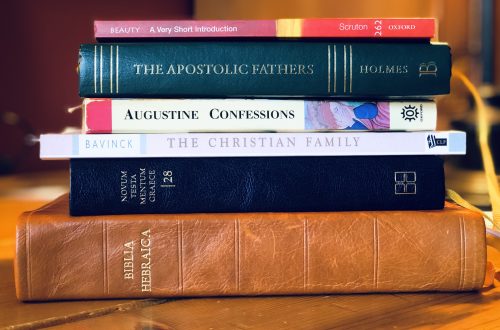 The latest issue of Touchstone magazine has a forum in which a diverse group of Evangelicals answer questions related to the state of Evangelicalism today. I am a contributor to this discussion along with Russell Moore, Michael Horton, Darryl Hart, John Franke, and David Lyle Jeffrey. The article is posted online, and you can read it here. Here are the questions that each of us answered:
The latest issue of Touchstone magazine has a forum in which a diverse group of Evangelicals answer questions related to the state of Evangelicalism today. I am a contributor to this discussion along with Russell Moore, Michael Horton, Darryl Hart, John Franke, and David Lyle Jeffrey. The article is posted online, and you can read it here. Here are the questions that each of us answered:
â— “How do you define ‘Evangelical,’ in a way that distinguishes Evangelicals from other believing Christians? And has this definition changed over the last several decades?”
â— “Has Evangelicalism matured since the 1950s, and if so in what ways?”
â— “Has it lost anything in the process of maturing (if it did)?”
â— “Are there any fundamental differences within the Evangelical movement today, and do you think they will deepen into permanent divisions, or even have already? How might they be healed?”
â— “What does your movement, speaking generally, fail to see that it ought to see?”
â— “What would you say to an Evangelical tempted to become Catholic or Orthodox?”
â— “What has Evangelicalism to offer the wider world that it will find nowhere else?”
â— “What else would you like to say?”
These questions open up the opportunity for each writer to get right to the heart of what they think evangelicalism is and where it is going. Having already read the answers from the other contributors, I can tell you that some of our answers vary widely.
By the way, if you are not a subscriber to Touchstone, you should be. Click here to sign-up now. You’ll be glad you did.




10 Comments
jeremy z
Denny I have a three corrections for you that you directly stated in your response.
1. Open theism has been embraced by many Evangelicals who insist that God cannot know the future choices of his free creatures.
You use the language of God cannot know the future choices. The language is very black and white and uses the thinking in all or nothing categories about the future–either the future is totally open or totally settled. Your all or nothing statement is simply not entirely true. Essentially open theism embraces a partly open and partly settled. It is like we are in a chess game with God and God has us checkmated at move 439, but we get to chose how we are going to get checkmated. God knows what move we are going to get checkmated, but we have the choice to chose the route.
2. At Fuller Seminary, for instance, the issue of inerrancy divided the faculty before being jettisoned as an essential Evangelical doctrine.
Again, this statement is not entirely true. Every Fuller faulty has to sign up statement affirming the infallibility of Scripture as well as students. I went there so I should know this. : )
3. Steve Chalke has suggested that the penal substitutionary view of Christ’s atonement is a form of “cosmic child abuse.â€
I think this is hilarous because it Steve is attacking the core reform doctrine. So the logic goes likes this: If one attacks my reform doctrine, then he or she is a heretic. Steve does not embrace the penal substitution theory of the atonement. The reformers need to get in their head, if one does not subscribe to the penal sub. they are not on a slippery slope. There are other perspectives in viewing the atonement. Again another all or nothing type of thinking.
Even though how nice it would be to live in a black and white world, we simply do not live in this reality! We live in a gray world. The reformer’s doctrine cannot answer the complicated questions Christianity and the church is being attacked with.
Blessings!
jeremy z
sorry for the many grammatical mistakes.
Please forgive me. I am repenting!
john
Without the penal sub. atonement, we have no Christianity. Liberalism has crept far into you.
A few passages that concrete this point:
(Isaiah 53:5) But he was wounded for our transgressions; he was crushed for our iniquities; upon him was the chastisement that brought us peace, and with his stripes we are healed.
(1 Peter 3:18) For Christ also suffered once for sins, the righteous for the unrighteous, that he might bring us to God, being put to death in the flesh but made alive in the spirit,
(Galatians 3:13) Christ redeemed us from the curse of the law by becoming a curse for us–for it is written, “Cursed is everyone who is hanged on a tree”–
And you went to Seminary? Fuller is a messed up place…
Mason Beecroft
Denny,
It sounds like the original Evangelicals (Lutherans) might have something to offer, although they are never mentioned. Of course, I am not surprised as sacramental and liturgical theology is anathema to most “evangelicals”. Rome and Constantinople are not the only “Great Tradition” options. I’m not saying that you missed this, but it seems that the “evangelical” line is drawn at the PCA, which may say something about what it means to be “evangelical”.
Also, we agree on the definition of the evangel, but we are distant on Holy Baptism, Holy Absolution, and Holy Communion. What might that suggest about defining “evangelical”?
Thank you for the contribution. I find it all quite compelling from my little corner as an Evangelical Catholic.
Pax,
+Mason
Bryan L
John when was the doctrine of PSA formulated in the church?
jeremy z
Fuller has messed up and broken people wanting something more than what has been spoon fed to them in Sunday School.
jeremy z
I am not denying the content in the Penal Sub. I am simply stating that there are better atonement theories that give a more hollistic approach to explaining Jesus’ death.
The beauty about Fuller is not fuller exposed me to different theories within theologies to reinforce why and what I believe. Many seminaries are so denominational specific, that the seminary essentially spoon feeds its student a theology that goes unprocessed and unquestioned, which leaves the student un-informed about the other interpretations of within the theological spectrum. Basically the student gets one idea, from one perspective; that will only work in one denominational setting.
Kyle
Jeremy…
How do you know that other seminaries simply “spoon feed” their students? Because the students affirm certain doctrines?
Blessings,
Kyle
Ken
jz: Would you please clarify point #2 in your first post above? I’m not sure if you are saying Fuller does or does not affirm inerrancy. If it requires subscription to infallibility (which is the stronger term–in the second grade I wrote several inerrant spelling tests, but I have never been infallible) then what is the hang-up over inerrancy?
jeremy z
Ken we are basically talking the same thing, but just using different types of language. However Fuller is aware of using the word of inerrant.
Fuller’s constitution states:
“Scripture is an essential part and trustworthy record of divine self-disclosure. All the books of the Old and New Testaments, given by divine inspiration, are the written Word of God, the only infallible rule of faith and practice. They are to be interpreted according to their context and purpose and in reverent obedience to the Lord who speaks through them in living power.”
We recognize the importance that the word inerrancy has attained in the thinking of many of our scholarly colleagues and the institutions which they serve. We appreciate the way in which most of them use the term to underscore the fact that Scripture is indeed God’s trustworthy Word in all it affirms. Where inerrancy refers to what the Holy Spirit is saying to the churches through the biblical writers, we support its use. Where the focus switches to an undue emphasis on matters like chronological details, precise sequence of events, and numerical allusions, we would consider the term misleading and inappropriate. Its dangers, when improperly defined, are: 1) that it implies a precision alien to the minds of the Bible writers and their own use of the Scriptures; 2) that it diverts attention from the message of salvation and the instruction in righteousness which are the Bible’s key themes; 3) that it may encourage glib and artificial harmonizations rather than serious wrestling with the implication of biblical statements which may seem to disagree; 4) that it leads those who think that there is one proven error in the Bible (however minor), to regard its whole teaching as subject to doubt; 5) that too often it has undermined our confidence in the Bible by a retreat for refuge to the original manuscripts (which we do not posses) whenever problems cannot otherwise be resolved; 6) that it prompts us to an inordinate defensiveness of Scripture which seems out of keeping with the bold confidence with which the prophets, the apostles and our Lord proclaimed it.
“The Bible is absolutely crucial to our evangelical stance, and so is our participation in Christ’s worldwide mission. As evangelicals, we believe men and women are lost without Jesus Christ; we believe that terrible judgment awaits all who reject Jesus as Lord and Savior.”
So what makes me weary, is when Denny makes public claims debunking what Fuller is doing.